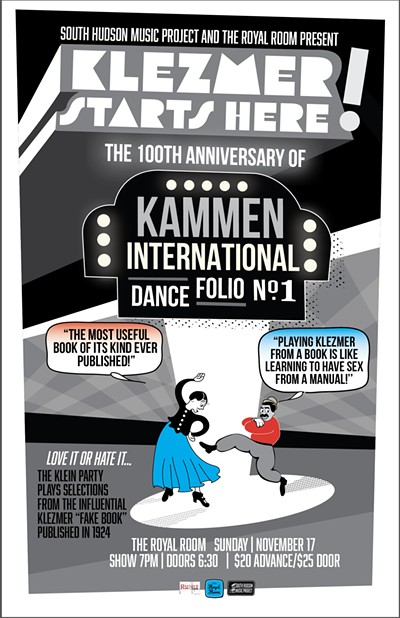Klezmer Starts Here: 100 Years of the International Folio of Dance Music
Sun, Nov 17, 2024 at 7pm
Doors: 6pm
Advance tickets can only be purchased online-we do not sell advance tickets at the venue. Refunds are not available within 48 hours of the event. Tickets do not guarantee seating during shows at the Royal Room.
We are now accepting reservations for diners! After purchasing tickets, please visit the Reservations page to book a table. Table reservations require advance tickets, and are only for guests who plan to dine at the Royal Room. We do not take reservations over the phone.
Seating for non-diners is first come, first served. Please arrive early to guarantee a seat!
The Royal Room is All Ages until 10pm.
Polish-born Yakov and Yosef Kamenetzky became Jack and John Kammen when they moved to NYC as children at the end of the 19th century. Starting as young musicians, they entered the field of music publishing. In 1924, they published the International Folio of Dance Music in versions for accordion, clarinet, saxophone, trombone, violin and other instruments. It became the most widely used Jewish wedding “fake book,” containing klezmer dance tunes, as well as Hungarian, Russian, Polish, Italian, and popular American tunes. It is credited and blamed for standardizing klezmer music which before then was always shared through oral traditions.
Klezmer Starts Here! is a curated series at Seattle’s Royal Room presented by The Klein Party and the South Hudson Music Project. Each concert focuses on a particular Yiddish music style or practitioner. The Klein Party serves as “house band,” with each concert featuring guest artists and ensembles from within and from outside the tradition.
The 2023 series focused on Belf’s Romanian Orchestra, Naftule Brandwein, Moshe Beregovski, and songs from Yiddish Theatre & Film. Guest artists included Zimyl Adler, Laurie Andres, Maia Brown, Evan Davis, Eric Eagle, James Falzone, Kim Goldov, Meaghan Guterman, Geoffrey Harper, Joanne Klein, Ray Larsen, Darren Loucas, Bernice Maslan, Sheridan Riley, Meg Savlov, Carl Shutoff, Megan Titensor, Neil Welch, and Aimee Zoe.
Klezmer is an instrumental musical tradition of the Jews of Central and Eastern Europe going back hundreds of years. The word “klezmer” derives from two Hebrew words: klei, meaning “tools, utensils or instruments” and zemer — “melody,” leading to klezmer — “musical instruments.” Over time, the word began to refer to the musicians themselves. Only in the 20th century did klezmeridentify a style of music. The main elements of the klezmer tradition include dance tunes, ritual melodies, and virtuosic improvisations played for listening. The klezmorim played primarily at weddings, as Jewish religious leaders had otherwise forbidden instrumental music since the destruction of the 2nd Temple, and non-Jewish authorities discouraged Jewish musicians from participating in the cultural life of most nations.
While klezmer began with melodies drawn from religious prayer, the klezmorim were itinerant, incorporating ideas from the other musicians with whom they played and the demands of the audiences in different communities. This included Ukrainian, Russian, and other Slavic folk songs, the music of the Roma (gypsies), Greek, Romanian, Ottoman, and Persian music, as well as the Western classical music of the times.
In the early 20th century, the music travelled to the United States, where it lost most of its traditional ritual elements and adopted elements of American popular music. After the destruction of Jewish life in Eastern Europe during the Holocaust and a fall in the popularity of klezmer in the United States, it saw a revival in the late 1970s. Since then, the klezmer scene has grown throughout the world, as musicians explore the traditional genre while continuing to develop the styles with elements of jazz, rock, and other forms.
The Klein Party celebrates and plays “klezmerish music from All the Old Countries with a jazz sensibility and rock-and-roll exuberance.” The core of the repertoire are original arrangements of Ashkenazi Jewish music from the Old World, as well as New World compositions from masters such as Naftule Brandwein, Dave Tarras, Abe Schwartz, Harry Kandel, I.J. Hochman, Lieutenant Joseph Frankel, Abe Elenkrieg, and the Epstein Brothers.
The Klein Party also explores other music that shares the ecstatic joy, emotional intensity, and unavoidable party music we call “klezmer.” This includes 19th and 20th century music from the Ladino tradition, Yiddish folk and theatre music, as well as Ellingtonia, novelty Americana, and songs from Albania, Australia, Bulgaria, Cuba, Hawaii, Ireland, Italy, Japan, Korea, Mexico, Persia, Poland, Portugal, Puerto Rico, Romania, Russia, Scotland, Sicily, Turkey, and Ukraine.
Over the past seven years, the Klein Party has played to thousands of enthusiastic listeners and dancers at the Royal Room, Pink Door, Northwest Folklife Festival, Washington Performance Center, Kirkland Performance Center, Vashon Center for the Arts, and many farmers' markets, holiday parties, picnics, International Ice Cream Day, and live streams.
www.thekleinparty.com



 network
network